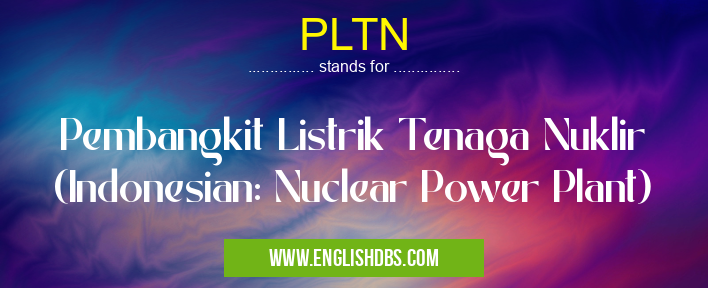What does PLTN mean in NUCLEAR
Pembangkit Listrik Tenaga Nuklir (PLTN) is a nuclear power plant, which is a type of electricity-generating facility that uses nuclear fission to create energy. PLTNs are typically large, industrial facilities that require a substantial infrastructure for their operation and maintenance. In this article we will cover the basics of what PLTNs are and how they work, as well as provide some frequently asked questions about them.

PLTN meaning in Nuclear in Academic & Science
PLTN mostly used in an acronym Nuclear in Category Academic & Science that means Pembangkit Listrik Tenaga Nuklir (Indonesian: Nuclear Power Plant)
Shorthand: PLTN,
Full Form: Pembangkit Listrik Tenaga Nuklir (Indonesian: Nuclear Power Plant)
For more information of "Pembangkit Listrik Tenaga Nuklir (Indonesian: Nuclear Power Plant)", see the section below.
Essential Questions and Answers on Pembangkit Listrik Tenaga Nuklir (Indonesian: Nuclear Power Plant) in "SCIENCE»NUCLEAR"
What is Nuclear Power Plant?
A Nuclear Power Plant (PLTN) is an electricity-generating facility that uses nuclear fission to generate energy. Nuclear fission occurs when atoms split into smaller particles and release energy in the form of heat and radiation. This energy is then used to produce electricity by turning water into steam and powering turbines which generate the electrical current.
How does Nuclear Power Plant works?
A Nuclear Power Plant works by using nuclear fission to generate energy. This process begins with uranium fuel rods being placed inside a reactor vessel and exposed to neutrons in order to start the chain reaction. As the uranium atoms split, they release heat and radiation, which is then used to turn water into steam that powers turbines that produce electricity.
What are the safety measures employed in a Nuclear Power Plant?
All Nuclear Power Plants must adhere to very stringent safety standards set by international regulations such as IAEA (International Atomic Energy Agency). These safety measures include emergency shut down procedures, highly trained personnel, containment of radioactive materials, effective waste management systems, emergency preparedness plans for potential accidents or natural disasters, regular maintenance checks on all equipment etc.
Are there any environmental concerns with using Nuclear Power Plants?
Despite its clean power output compared to other sources of electricity generation such as fossil fuels, there are still some environmental concerns when it comes to using Nuclear Power Plants. These could include radioactive waste disposal/storage, hazards associated with transporting fuel rods or other radioactive materials as well as possible impacts from increased radiation around the power plant area due to its operation.
Are there any alternative sources of energy besides nuclear power plants?
Yes! There are many alternative sources of energy such renewable energies like solar and wind power or even more traditional options such as hydropower or biofuel production facilities. For example, solar photovoltaic cells can directly convert sunlight into usable electricity without releasing any emissions or pollutants into the environment while wind turbines can use moving air masses to create kinetic energy and turn it into usable electrical form.
Final Words:
Pembangkit Listrik Tenaga Nuklir (PLTN) is an important source of clean energy production but it also carries with it some associated risks that need to be managed properly in order for it to be sustainable in the future. By understanding how these plants work and how their operations impact our lives and environment we can ensure their safe operation for many years ahead.
